
June/July 2005
UNITING FOR IRAQ AND PALESTINE
Palestine, the Antiwar Movement and the September 24 Demonstrations
April 20, 2002 was an historic day for the U.S. anti-war movement. Amidst the siege of Jenin, rampant Zionist brutality and surging Palestinian resistance, tens of thousands upon tens of thousands of Arabs and Muslims in the United States took to the streets in a massive demonstration that united protesters against the World Bank and International Monetary Fund, antiwar demonstrators gathered to denounce the ongoing U.S. war on Afghanistan and at-the-time impending war on Iraq and the Arab and Muslim communities of the United States in outrage against war, racism, colonialism, occupation and oppression.
Numerous demonstrators that day felt the power of the occasion. As almost never seen before in the streets of Washington, DC, the Arab community was visible in force, making its voice and its issues heard clearly. Palestinian flags surged through the air, speaker after speaker reiterated and reaffirmed the national rights of the Palestinian Arab people, and communities united with one another in a powerful display of dedication to justice. Entire families marched along the route, from babies and small children to the elderly. In communities across the country, on the streets, in mosques, in community centers, Arabs and Palestinians responded to the call to march and organized buses and caravans to Washington, DC, organizing everywhere for the demonstration. The situation in Palestine that was prompting a major resurgence in Palestinian and Palestine solidarity activism across the country similarly reflected itself in the streets of Washington, DC; Arabs and Muslims expressed their commitment to the liberation of Palestine and all Arab land, as antiwar and antiglobalization activists linked arms with them, standing together in a common protest against war and racism.
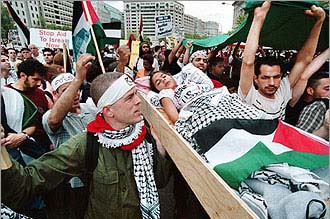
Demonstrators for Palestine march in Washington, DC on
April 20, 2002. |
Now, in July 2005, the U.S. government’s colonial occupation of Iraq continues and a daily toll of Iraqi and U.S. casualties mounts as the Iraqi people continue to resist occupation. The U.S. war and occupation in Afghanistan continues. In Palestine, despite the facile promises of “disengagement” and a “peace process,” the murderous occupation continues and six million Palestinian refugees are still denied their right to return home. The horrors of the U.S. prisons at Abu Ghraib, Bagram Air Base and Guantanamo Bay have become known around the world, through the accounts of their victims and the photographic evidence captured by the torturers. Within the U.S., military recruitment has fallen dramatically; for the first time in years, the military finds itself unable to meet its recruitment goals as parents and families warn their children against the dead-end path to destruction that is the U.S. military, that has long strengthened its ranks by focusing its recruiting upon communities of color and working class communities.
On September 24, 2005, thousands again will gather in Washington, DC, as they have on many occasions in the past three years, to protest war and racism. The situation in Iraq calls desperately for action within the U.S., and a rise in antiwar sentiment could make it possible for this mobilization to be the largest seen for at least a year. However, the organizing for the September 24 demonstrations has been marked by a discussion of “unity” and “disunity” in the antiwar movement, a discussion that in many ways parallels that which took place on April 20 – when four separate demonstrations, including two separate rallies with stages and speakers, were held in DC because some refused to center their organizing around Palestine and link arms with the Arab and Muslim communities. All of those demonstrations eventually united into one closing march and rally – the demonstration, called by the ANSWER Coalition, that focused on Palestine, had been by far the largest – in which the presence of Palestine could not be denied, and even the Washington Post described it as the U.S’ “largest pro-Palestinian event.” There are currently two calls to demonstrate on September 24 – the call issued by the September 24 National Coalition, initiated by the ANSWER Coalition, and including the Troops Out Now Coalition – and that issued by United for Peace and Justice. Both call upon local organizers to gather buses and caravans to Washington, DC, to organize to stop the war. However, the significant difference in the calls to action is highlighted as one reads the flyers and literature of the September 24 National Coalition – “End Colonial Occupation – Iraq, Palestine, Haiti..” “Support the Palestinian People’s Right to Return!” The September 24 National Coalition includes such organizations as the National Council of Arab Americans, the Muslim American Society Freedom Foundation, and Al-Awda, the Palestine Right to Return Coalition. And the United for Peace and Justice call, issued several days after the initial call made by the ANSWER Coalition, for the same date – September 24 – and the same city – Washington, DC - includes nary a word about Palestine or the Palestinian people. Statements from United for Peace and Justice, however, have been forthright in their refusal to work with any of the anti-imperialist antiwar coalitions for September 24.
It is over three years since April 20, 2002, and much has changed in the antiwar movement in that time. The upsurge seen on April 20, and then again on October 26, 2002, January 18, February 15, March 15, March 22, 2003 did not – as many expected – prevent the war on Iraq. However, rather than the pitch of the movement intensifying after the launch of the illegal, unjust war, the disillusionment of some about the possibilities of making change and the diversion of antiwar energy to support for the Democratic Party and its candidate, John Kerry, in the 2004 elections despite Kerry’s open and professed support for the war and proud support of Zionist colonialism led to an overall dissipation of antiwar activity. Some of the latent strength of the movement and the possibilities for a resurgent movement were visible on March 20, 2004, one year after the launch of the war on Iraq. Once again, tens of thousands took to the streets across the U.S., met by thousands upon thousands more around the world. And once again, it is essential to note, the demands and principles of Arab organizers were heard in the demonstration as it called for an end to colonial occupation “from Iraq to Palestine to Haiti and everywhere!”
Prior to the March 20 demonstration, United for Peace and Justice leadership had insisted on excluding any reference to Palestine in the major slogans and calls to the demonstration. Once again, two major calls to demonstrate – one from UFPJ and the March 20 National Committee, and one from ANSWER and the March 20 National Coalition, including the National Council of Arab Americans, Al-Awda, the Palestine Right to Return Coalition and many other organizations – were issued to the public, with the call to support the Palestinian struggle a primary and visible difference between the two. Despite a majority vote by UFPJ activists in New York City to support a call to address Palestine in the demonstration, the leadership continued to resist. In the end, it was the involvement and leadership of the Arab American community that was crucial. An historic Open Letter to the Anti-War Movement was issued by 41 Arab American community organizations that eventually won the support of over 200 organizations that demanded that the Palestinian voice be heard in the antiwar movement. Stated the Open Letter, "We do not accept delinking the struggle of the Palestinian people from the anti-war movement, and regard the struggle in Palestine, as it is viewed worldwide, to be central to any peace and justice mobilization. ... We view all attempts to relegate our collective presence to the margin and to tokenize our participation in the movement to be racist in character. In its attempt to silence the Arab and Muslim voices for decades, particularly that of the Palestinian people, the movement in the U.S. has stood alone in the global movement for justice. We see ourselves as full partners in leading the movement as signified in the heavy price we continue to pay along the way, and reject any attempt to objectify our presence." This letter, and the support that gathered around it, was crucial in establishing principled unity for the March 20 demonstration – that, contrary to repeated assertions against supporting the Palestinian struggle, surmounted all expectations in regard to turnout.
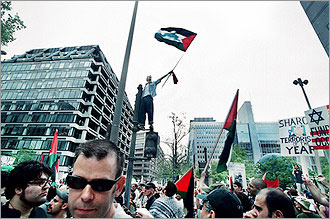
Demonstrators in Washington, DC on April 20, 2002.
|
September 24 has the potential to consolidate antiwar forces and launch a new stage of the antiwar movement, in response to the historical developments in the war – the polls showing majority opposition, the drastic decrease in military recruitment, the resilience of the Iraqi resistance. It also has the potential to once again be a major day of mobilization for the Arab and Muslim communities and specifically for the Palestinian Arab community, against the war on Iraq, but, inextricably, also, for the right to return and for the Palestinian cause. It is an opportunity to break the chains of fear that the U.S. government is attempting to enforce on Arab and Muslim communities through persecution, and to evidence the power and strength of active communities, mobilized and ready for action. September 24 has the potential not only to revitalize the U.S. antiwar movement in response to historical political developments, but also to revitalize the mobilization of Arab and Muslim communities and expand community organizations and institutions, and to cement the ties and links of mutual solidarity between the Arab and Muslim communities and the U.S. antiwar movement. Certainly, there has already been an enthusiastic response to the formation of the September 24 National Coalition, with a number of Arab and Muslim organizations joining the leadership of the coalition and demonstrating eagerness to organize the community in a way that recalls the period before the April 20 demonstration.
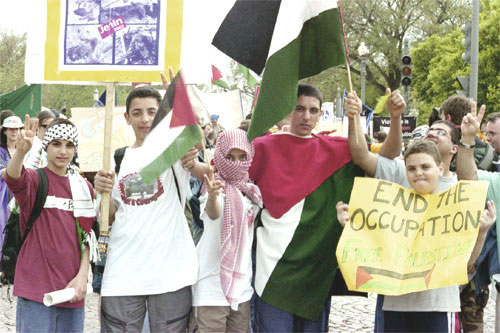
The lead banner in San Francisco on March 20, 2004
|
Thus, the same forces that have branded calls to support Palestine as “divisive” have openly expressed their commitment to division for September 24! Rather than support the demands of the Arab American community to address the Palestinian struggle and its core issue, the right to return, UFPJ has pledged to go it alone – while calling for a mobilization in the same place and at the same time as that of the September 24 National Coalition.
It is imperative that unity in the antiwar movement be a unity that is real and principled – a unity that means including, not excluding, the demands and voices of oppressed communities. Broadening the movement in a real way means welcoming oppressed communities as full partners and full participants in the movement, with the right to define their struggles and their movements within their own parameters, and not the parameters of the Democratic Party or the parameters of Zionism. The occupation of Palestine is integrally linked to the occupation of Iraq; it is not a side issue, rather the occupations are partner colonial occupations of Arab land by U.S. imperialism and by its Zionist proxy, the state of “Israel.” The U.S. war on Iraq is a continuation and expansion of the colonial occupation of Arab land seen in Palestine. The Palestinian cause is indeed a Palestinian struggle – but it is also an Arab struggle, and it is also an international struggle. It is a struggle for the liberation of all Arab peoples, and a struggle for the liberation of all oppressed peoples from imperialism. Working to end the occupation of Iraq is critical and essential, and a responsibility here in the United States. A victory for the people of Iraq is a victory for the people of Palestine. Similarly, working for a free Palestine, and for the anchor of the Palestinian struggle, the right to return, is a responsibility in the United States – the country responsible for the political, economic and military support that has enabled Zionist occupation for over 57 years; and a victory for the people of Palestine is also a victory for the people of Iraq.
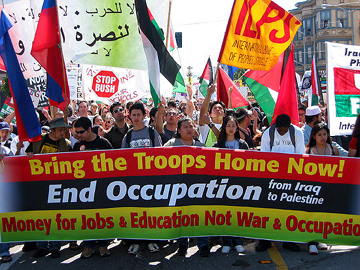
Youth march for Palestine in Washington, DC on April 20, 2002.
|
Some have attempted to justify the refusal of United for Peace and Justice and its supporters to recognize the importance of the Palestinian cause and the right to return; they have made many claims, suggesting, for example, that the right to return is “difficult to understand,” that it will “alienate” potential demonstrators, and that it is “abstract.” In reality, there is nothing difficult to understand about the idea that Palestinian refugees were forced from their homes and villages because they are Palestinian Arabs and have been prohibited from returning to those homes and villages ever since, for one reason, because they are Palestinian Arabs. In addition, the right to return is quite easy to understand precisely because it gets to the root issues in Palestine. Zionist and U.S. mythologies about Palestine are easier to accept when stripped of their historical context; they fall apart when exposed to reality. Al-Nakba – the 1948 catastrophe when over 750,000 Palestinians were forced from their homes and lands due to Zionist occupying forces - and the ongoing struggle for return provide a vivid illustration of reality in Palestine, and furnish a clear understanding not only of the goals of the Palestinian national movement, but also of the racist character of the Zionist state, of why that state occupies and oppresses, of why it destroys Palestinian homes and builds walls around Palestinian communities. The right to return is linked inextricably to the liberation of Palestine. Without return, there is no liberation; without liberation, there is no return.
Ted Glick, of United for Peace and Justice and the Independent Progressive Politics Network, notes the similarity between September 24, 2005 and April 20, 2002, in his article, “Building Unity at a Time of Possibility.” However, rather than welcoming the leadership and involvement of the Arab community, Glick finds it “troubling that ANSWER has put forward the demand, ‘Support the Palestinian People’s Right of Return’ as a major demand,” and is also troubled that the Troops Out Now Coalition “held a conference earlier this month on the topic, ‘Building a United Front to Stop the War,’ and the first bulleted point that they made in their website report of that conference was that ‘Support for the Right of all Palestinian refugees and their descendants to return to their original homes and property in all of historic Palestine is not negotiable.’” Glick further states that he recognizes the “right of Palestinian organizations to put this demand forward as they struggle to end the Israeli occupation of Gaza, the West Bank and East Jerusalem…It must be dealt with as part of the process of serious negotiations between the Palestinian and Israeli government representatives, leading to an end to the Israeli occupation.”
The demand for the right to return is fundamental, basic, and existential. It is not merely a slogan, but rather, something that can be realized in reality - the return of Palestinian refugees to their original homes and villages, the healing of Palestine, the undoing of past crimes. It is impossible to understand self-determination for Palestinians without the right to return. There is no real self-determination in a state in the West Bank and Gaza only, where perhaps "some" Palestinian refugees can "return," when those Palestinians aren't from the West Bank and Gaza. Self-determination for Palestinians can only mean self-determination across all of historic Palestine. The creation of a Palestinian state does nothing to abrogate the right to return of Palestinian refugees. The Zionist state should withdraw its military forces from Palestinian land, and that land should be reclaimed - but that does nothing to hinder the rights of Palestinian refugees. The continual Zionist/imperialist pressure upon the Palestinian Authority and its ilk to negotiate away the right to return - something they don't have the authority or the ability to do – does not abrogate a fundamental, individual, collective, national and human right that belongs to every Palestinian refugee. The right to return is not a mere negotiating demand, and the Palestinian and Arab community do not need to have their demands confined and limited by Glick and others who claim to support their rights.
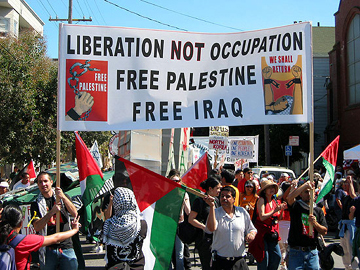
Demonstrators march in San Francisco on March 20, 2004.
|
Virginia Rodino, also of the steering committee of United for Peace and Justice, puts forth a different reasoning for excluding discussion of Palestine from September 24. Rodino, correctly, asserts that the war in Iraq is part of “the system of U.S. imperialism, whose path is paved by U.S. military plunder, intervention, and threat across the globe: from Iraq to Palestine, from Venezuela to Cuba, from Syria to Lebanon, from North Korea to Haiti, from Latin America to Africa.” However, despite her recognition of this reality, Rodino then insists that “noble and justified stances such as unconditional support for the Iraqi resistance and Palestinian right of return shuts the door of engagement between the movement and groups such as Iraq Veterans Against the War and Military Families Speak Out. These groups, as we learned in Vietnam, must be the backbone of today's anti-war movement in order for us to succeed in our quest for peace.” Rodino does not back up this assertion; she merely states that these positions “shut the door of engagement.” Neither IVAW nor MFSO have made statements against the right to return. While both groups’ members hold a variety of positions on the Iraqi resistance, it is not clear why Rodino assumes these organizations are opposed to the right to return, and many members of both groups have spoken in support of Palestine and the right to return. One suspects that it is not IVAW and MFSO that are opposed to the right to return – but rather the so-called “soft” Zionists who have been involved in U.S. Left politics in various positions. Welcoming and including Zionists should not be a priority for any movement committed to justice and liberation rather than racism and subjugation. Furthermore, Rodino’s conclusion obscures a fundamental reality – the backbone of the antiwar movement is, in reality, those who are most directly affected by occupation and war – the Iraqi people and the Palestinian people, and their Arab sisters and brothers around the world, including those within the United States. Again, Rodino is willing to exclude and minimize the demands and positions of those directly affected by imperialism in order to “include” those who would make accommodations to it.
“We are many, they are few,” is perhaps a progressive cliché. However, in the case of the antiwar movement and Palestine, it is visibly true. Those few who have carved out leadership positions within the antiwar movement, but whose loyalty to the Democratic Party, and, fundamentally, to imperialism, prevent them from challenging imperialism at its root, in Palestine and in Iraq, do not represent the vast majority of those who are disenchanted with the lies of war. The working-class families and families from oppressed communities counseling their children to stay away from the military do not benefit from occupation in Palestine, or in Iraq. The vast majority of people in the United States have no stake in supporting oppression in Palestine, and indeed, have an interest in seeing an end to U.S. support for colonialism there – on a practical level, the $15 million daily the U.S. government spends on aid to the Zionist regime could be much better used for housing, education and health care. The oppressed communities and communities of color in the United States have no interest in supporting racism abroad or at home. A broader, stronger and more united antiwar movement is forged, not by excluding the demands and struggles of oppressed communities, but by welcoming those communities as full partners in the struggle for our collective future.
The occupation of Iraq cannot be delinked from the occupation of Palestine – and neither should our struggle for the freedom of both. Once again, the Arab and Palestinian communities are leading the way for the antiwar movement as a whole. This means, for September 24 and beyond, as it did on April 20, 2002, and March 20, 2004, real and principled unity – calling for an immediate end to war and occupation and all troops out of Iraq now, and support for the Palestinian struggle and its fundamental core, the full and unconditional right to return of all Palestinian refugees to all of historic Palestine.
The September 24 National Coalition is calling for a mobilization at the White House at 12 noon on Saturday, September 24. Buses will be leaving from New York and New Jersey. The ANSWER Coalition initiated the September 24 National Coalition; more information may be found at its website, http://www.answercoalition.org/; New Jersey Solidarity – Activists for the Liberation of Palestine has endorsed this demonstration and will be mobilizing to attend and march.
Contact us: Al-Awda Newspaper
(973) 954-2521
info@newjerseysolidarity.org
http://www.newjerseysolidarity.org
New Jersey Solidarity
344 Grove Street, Suite 131
Jersey City, NJ 07302
Our editorial collective is responsible for editing, laying out and developing this publication. We are open to new members who are in accord with the mission and principles of this newspaper.
Please contact us about your upcoming events and activities of interest to readers of this publication.
Please contact us for advertising rates and information, or for material on becoming a distributor.